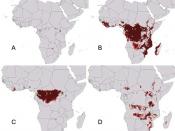The Effects of the Ebola Virus On Humans Introduction The Ebola Virus was named after the Ebola River, which is located in the Democratic Republic of the Congo, where the virus was discovered in 1976. The Ebola Virus is the name that was given for a strain of viruses that belong to the Filoviridae family. This strain of Virus ranges from 800 to 1000 nanometers (one-billionth of a meter) in length and is made up of strands of RNA. The RNA is held in an envelope that was created by a host cell which is covered with spikes (www.encarta.com 1). Scientists so far have discovered four kinds of this virus which are able to cause disease in human. These types are: Ebola-Zaire, Ebola-Sudan, and Ebola-Ivory Coast (www.cdc.gov 1). This paper discusses the effects of this virus on humans.
Natural Reservoir Although the Ebola virus' habitat is unknown, however, from similar viruses and other evidence scientist believe that this virus is zoonotic (animal-borne).
They also believe that the animal that carries it is native to the African continent. (www.cdc.gov 1) Symptoms There are many symptoms associated with the Ebola Virus. First of all it causes Hemorrhagic fever. This fever consists of a number of severe symptoms such as headaches, weakness muscle aches, vomiting abdominal pain, diarrhea, pharyngitis, conjunctivitis, bleeding from openings in the body, obliteration of internal tissue, exhaustion, blindness and death. The time from exposure of the diseases is about three weeks. The mortality rates for this virus are shown on the charts below. Researches are still not sure how a percentage of people are still able to live through the disease. (www.encarta.com 2) Types of Ebola Viruses In an interview with Fredrick A. Murphy he discusses the types of Ebola viruses and how they are classified: The...


